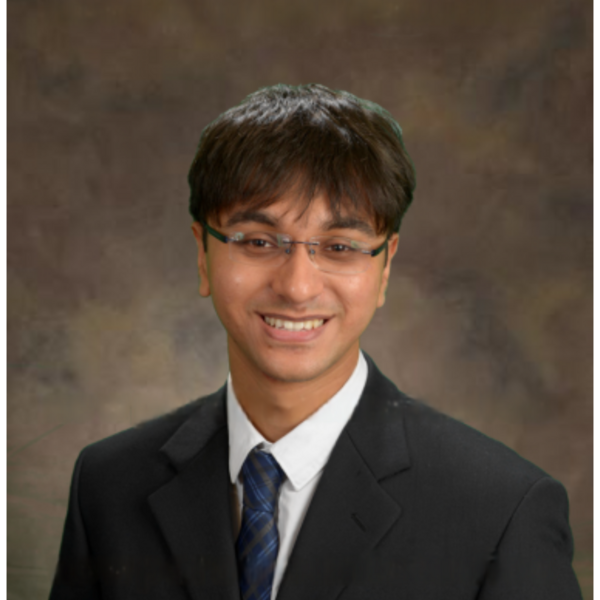Breadcrumbs
Raj Parekh
Undergraduate Student Leader: Biochemistry

Personal Statement
Moving to Canada from India for university three years ago made me quickly realize that temperature wasn’t the only difference between the two countries. It was an exciting fresh start, but it challenged my worldview and spurred my personal growth in unexpected ways. The most prominent difference was pedagogical. My coursework as a life sciences undergraduate was vastly different from the Indian high school curriculum, in that it assigned significant weight to classroom participation and experiential learning in addition to tests and assessments. I took this not as an obstacle but as an opportunity, and engaged in meaningful discussions, formed study groups with my peers, and took advantage of courses that offered lab experience to explore my interests. Being proactive in my first year helped me discover my passion for biochemistry, which drove me to pursue a Specialist in the program. Over the course of my degree, I have taken interdisciplinary coursework and maintained a cGPA of 3.92 while engaging in long-term research projects in both basic and translational science through thesis courses and summer research programs. I am currently pursuing thesis research in Dr. Igor Stagljar’s lab in the Department of Biochemistry, with the goal of generating stable mammalian cell lines that can be used as a cancer drug-screening platform. As a student researcher, I have also honed my scientific communication skills by presenting my research at poster competitions, such as the Biochemistry Summer Poster Competition in July 2024 where I won first prize. My passion for cancer biology and my positive experience in scientific research has consolidated my desire to pursue doctoral research in the field after graduation.
Beyond my academics, I have also been active in various student-run organizations to promote change through advocacy and build a cohesive community and vibrant campus life. In second year, I joined the Sustainability Commission at Victoria College to advocate for equitable climate action from the university. I helped organize the UofT chapter of the Fridays for Future Climate Strike and generated awareness about sustainability through engaging social media content. Organizing these events gave me the opportunity to channel my climate anxiety into productive climate action and facilitate important conversations around climate change in the student community. In my third year, I ran for and was elected the Academic Co-Chair of the Molecular Genetics and Microbiology Student Union. As Co-Chair, I organized academic seminars and a Cancer Conference with other executive members of the student union to bridge the gap between
faculty and students. Events like these made the amazing research in the department more accessible to undergraduate students and offered them a space for academic growth outside the classroom. I also organized Coffee with Profs – a networking event for undergraduate students to chat with their professors in an informal environment. These events had high turnouts and allowed students to gain vital insights into their own research and career goals through conversations with professors and mentors. Ultimately, I was able to foster an environment where students felt a strong sense of belonging towards the department and the scientific community.
Having grown up in a fairly homogeneous community, my personal identity had seldom occupied my thoughts. Suddenly, in my first year, it became painfully visible – to myself, to the cashier who made a remark about my accent, and to everyone in between. Walking the tightrope between conforming to new cultural norms and tapping into my rich heritage was challenging, which is why I signed up for a mentorship program and connected with upper-year international students who understood the quintessential immigrant experience. I gained so much from the program that I signed up to be an International Mentor myself for the next two years, helping international students navigate uncomfortable experiences like culture shock and easing their transition into university. Through events like International Food Fest and Cultural Karaoke, I was able to bring to the forefront UofT’s cultural diversity and foster an inclusive and welcoming community for all students. I continued this work over two summers as an E-Mentor, offering guidance and support to incoming freshmen through online socials, Q/As, and by sharing resources. Currently in my senior year, I have taken my role a step further by working as a Don at an on-campus residence, where I mentor 47 students and help them tackle the hiccups and hurdles of university life. I act as a first point of contact for my students, always around to lend an ear and offer support for a variety of challenges – from academics to mental and physical health, to emergencies.
To channel my passion for making groundbreaking research accessible to the general public, I worked as a Science Communications Assistant in the Cell and Systems Biology Department. In this role, I wrote engaging articles and press releases highlighting the research in the department and made eye-catching graphics for the department’s social media feed. The content that I created ignited interest from donors, collaborators, and students in the department’s activities. Beyond campus activities, I am also volunteering for LiveGreen Toronto, an offshoot of the City of Toronto’s Sustainability Division that focuses on encouraging local climate initiatives and outreach. Universities can sometimes be ivory towers, and connecting with other volunteers through the program has allowed me to better understand how the general public perceives climate change and sustainability. Taking initiative and trying out new experiences has spurred my personal growth in numerous ways. It has made me an effective team player, a patient listener, and a responsible and organized student who can balance competing priorities while carving out time for self-care and hobbies. I am grateful for having had limitless opportunities to learn and to lead and am excited to continue on this path in graduate school next year.